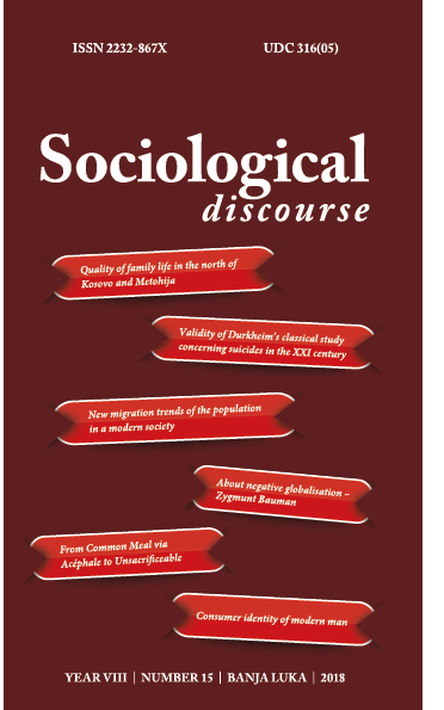From Common Meal via Acéphale to Unsacrificeable
From Common Meal via Acéphale to Unsacrificeable
Author(s): Bernard HarbašSubject(s): Political Philosophy, Social Philosophy, Contemporary Philosophy, Structuralism and Post-Structuralism, Cultural Anthropology / Ethnology, Culture and social structure , History and theory of sociology, Social Theory, Sociology of Culture, Ontology
Published by: Naučno udruženje Sociološki diskurs
Keywords: Acéphale; Jean-Luc Nancy; ideal body; Georges Bataille; Émile Durkheim; sovereignty; headless community; inoperative community; unsacrificeable;
Summary/Abstract: In this article, the author introduces several approaches to the concept of sacrifice. It begins with the classic sociological approach of Émile Durkheim who in sacrifice remarks forming, strengthening and maintaining of a community. In his anthropological conception, Georges Bataille demonstrates that the production and accumulation of wealth are wrong moral principles and suggests a new moral practice of giving oneself without asking anything in return, which represents the only way to realize a society of equals. Such a society, in which there would be no leader or a singular sovereignty, he calls Acéphale. For Jean-Luc Nancy, sacrifice is impossible. Starting from a standpoint that the Being is nothing and that there is nothing except this worldly plurality, Nancy considers sacrifice impossible since there is no higher principle for which the sacrifice would be performed. Beside the standpoints of the above-mentioned theoreticians, this article also offers a theory of discipline and sacrifice for achieving a socially expected perfect appearance. In all the mentioned theories, non-classic dimension of sacrifice is demonstrated. In them sacrifice is performed as activity for achieving social unity, greater equality, socially expected appearance and it is also presented as something impossible.
Journal: Sociološki diskurs
- Issue Year: 8/2018
- Issue No: 15
- Page Range: 109-117
- Page Count: 9
- Language: English

